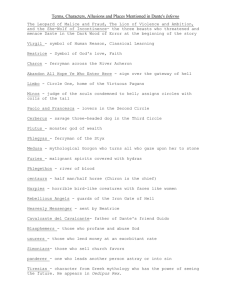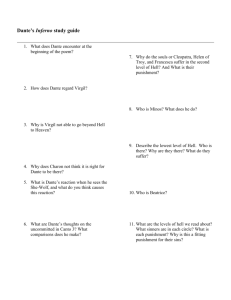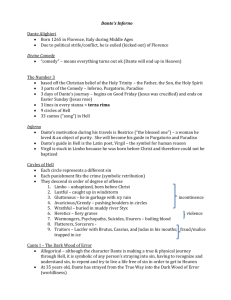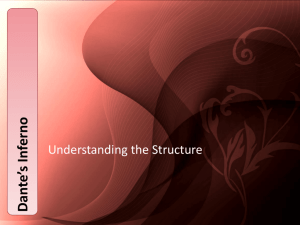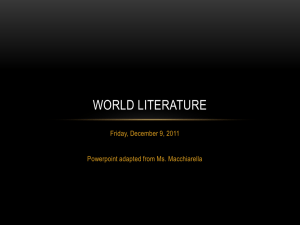Granger To Hell and Back Sammy Granger AP English P. 4 2/7/13
advertisement
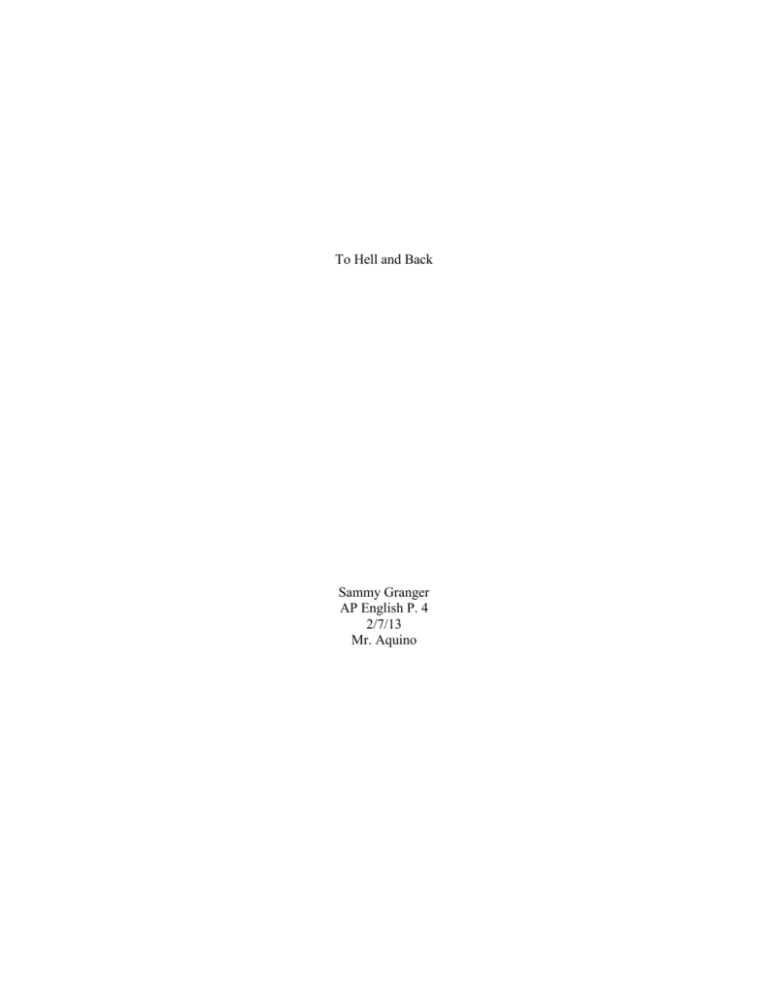
To Hell and Back Sammy Granger AP English P. 4 2/7/13 Mr. Aquino Granger 1 According to Christian doctrine, hell is a metaphor for eternal separation from God, a simple concept that took on a gruesome nature through centuries of interpretation of sins in organized religions. People needed a reason to live a life in accordance with God’s laws, thus came the fiery pit known today. The caricature that is hell can be attributed in part to the first part The Divine Comedy, also known as Dante’s Inferno. The thirty-four cantos describe Dante’s guided journey through the levels of hell. Dante’s apparent motivation to create this hell is seen through the paradoxical nature of his writing. His style was new for the times a style resembling modern parodies on current events such as “The Daily Show” or “The Onion”. Dante wrote Inferno about politics using religious allegory in a common language in order to reach the common man of his era, relaying his idea that religion and politics are two sides of the same coin, and their separation is paramount for a successful civilization. Dante’s version of hell is like nothing that had been seen before. Dante’s journey is initiated by three divine women, one of whom, Beatrice, is known to be his muse, they lead him on the ‘right road’ instead of allowing him to stumble into the ‘forest dark’. His exposure to hell and all he sees there is meant to direct him toward a pious life. He is guided on his journey by Virgil, who is immortal in his stories, much as Dante wishes to be. Dante divides the place of eternal damnation into levels based on the severity of sins committed in life. For example, the seventh circle, second ring, is where the souls of those who committed suicide writhe. They are trees, and whenever a branch is snapped or a leaf falls, they feel the same pains as one would feel when dismembered. Their human forms hang from their branches, and the souls are unable to assume human forms for eternity because they disregarded their bodies in life. The souls are granted their wish only after recognizing the error in their ways. There are quirks to Dante’s style and story, like his combination of Theology and Mythology and the fact that murder is considered a lesser sin than suicide. Supposedly, this is because the sins are ranked based off of strict Christian values, not human happiness or harmony on Earth but rather the will of God. I feel that Dante had other motives. Inferno is a massive allegory. I felt that Dante’s organization of hell was not really to God’s will, but rather a way to make his life and his love of Beatrice morally perfect. In Canto Two Dante writes of how his journey came to be, first the divine Beatrice is sad about his life choices, and then St. Lucia is distraught because she heard of his plight from an unnamed divine, assumedly The Virgin Mary. Dante’s Granger 2 choice to include this chain of command places extreme importance on his relationship with Beatrice. There was special consideration from the Virgin Mary. How much more morally perfect can a relationship be? His preference of love is also shown in Canto Five through the lustful and Dido. She committed suicide, but is sentenced to a lesser circle in Dante’s hell because he believes that her only sin was that she loved someone too much. Also, Dante feels pity for the souls that are sentenced for adultery because they too were in love, but just at the wrong time with the wrong person. His pity for these souls seems to go against Christian doctrine, for to pity the punished is to lack the understanding of Divine justice. Christianity forces people to choose sides, and I feel that humans are fallible, and when put in tempting situations with out a hell like Dante has created to end up in as punishment, it would be difficult to choose the right path. As Dante goes deeper into hell, the religion and state allegory becomes more evident. In the lowest level of Hell, Lucifer perpetually chomps on Judas, Brutus, and Cassius. Judas committed a crime against the highest authority of Christianity by giving up Christ; he is in Lucifer’s mouth headfirst. Brutus and Cassius betrayed Cesar, who Dante saw as the pinnacle of political power; Brutus and Cassius are in the mouth of Lucifer feet first. The difference of the placement of the souls, but also the fact that they are on the same level shows Dante’s belief that the Church and State should be separated but be equal. Dante believed that The Church in Italy at the time had over stepped its bounds, and much like Jon Stewart and the writers of “The Onion”, today he knew he had to find a way to reach the masses with his message. His chosen audience the common people was keen on religion, just like today’s people enjoy biting sarcasm with their political discussion. He took the religious aspect that they knew and melded it seamlessly with the problems he saw in society in order to spread his message. Dante wanted to share his thoughts on the problems of the current political climate, and he knew that the common man of the time was compelled by religion and easily swayed by it. His tactics were successful; for his wish of immortality was in a way granted as he is still discussed today. Inferno is overflowing with symbols and extremely ambiguous. Dante was one of the original political satirists. I am not sure Jon Stewart would exist had Dante not written Inferno. Maybe political extremists are right, there just might be a special place in hell for people like Stewart and Dante.
